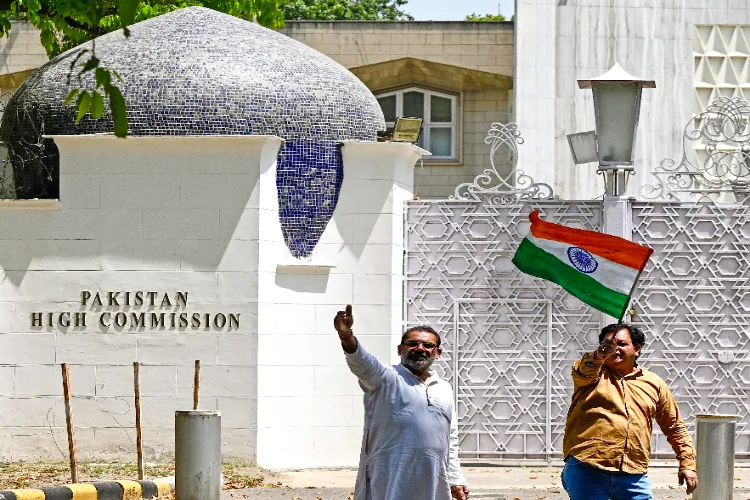
Islamabad
Pakistan on Thursday put the Simla Agreement and other bilateral accords with India on hold, suspended all trade, closed its airspace for Indian airlines and said any attempt to divert the water meant for it under the Indus Water Treaty will be considered an Act of War.
Islamabad also closed the Wagah border post, cancelled visas given to Indians under the SAARC Visa Exemption Scheme (SVES) and asked military advisers at the Indian High Commission to leave –- mirroring steps taken the previous evening by India over the Pahalgam terror attack.
The Pakistani announcements followed a meeting here of its National Security Committee chaired by Prime Minister Shehbaz Sharif in response to the Indian decision on Wednesday to suspend the Indus Water Treaty and downgrade diplomatic ties with Islamabad.
That call was taken by India after the attack Tuesday in Pahalgam that killed 26 people, mostly tourists. The Resistance Front (TRF), a proxy of the banned Pakistan-based Lashkar-e-Taiba claimed responsibility for the attack.
On Thursday, without naming Pakistan, Prime Minister Narendra Modi said at a public meeting in Bihar that the killers of Pahalgam will be pursued “to the ends of the earth” and promised to “identify, track and punish every terrorist and their backers”.
As tensions escalated, Pakistan’s Deputy Prime Minister and Foreign Minister Ishaq Dar postponed his visit next week to Bangladesh. The stock market in Pakistan saw a sharp dip Thursday.
A statement issued after the Islamabad meeting, which included key minister and the three services chiefs, said Pakistan’s armed forces “remain fully capable and prepared to defend its sovereignty and territorial integrity against any misadventure”.
Defence Minister Khawaja Asif said there were reports that India was planning to target different cities through terrorist acts. “If our citizens are targeted then Indian people will also suffer,” he told reporters after the meeting," he told reporters.
Pakistan pointedly mentioned the 1972 Simla Agreement that said differences will be settled through negotiations, and recognised the Line of Control between the two countries.
"Pakistan shall exercise the right to hold all bilateral agreements with India, including but not limited to the Simla Agreement, in abeyance till India desists from its manifested behaviour of fomenting terrorism inside Pakistan; transnational killings; and non-adherence to international law and UN Resolutions on Kashmir,” it said.
The statement said Pakistan will close down the Wagah border post with immediate effect. On Wednesday, India had closed the Attari border point.
"All cross-border transit from India through this route shall be suspended, without exception. Those who have crossed with valid endorsements may return through that route immediately but not later than April 30," Pakistan said.
Pakistan said all visas under the SAARC Visa Exemption Scheme (SVES) issued to Indian nationals were deemed cancelled, with the exception of those given to Sikh pilgrims.
Pakistan declared the Indian military advisers at New Delhi's mission in Islamabad persona non grata, asking them to leave by April 30, replicating the Indian move. Their support staff would also leave. New Delhi, in any case, had announced the previous evening that it is pulling its own personnel from the high commission.
The strength of the Indian High Commission in Islamabad will be reduced to 30 diplomats and staff members, the same as that of Pakistan in India.
"All trade with India, including to and from any third country through Pakistan, is suspended forthwith," the statement said.
Pakistan’s NSC “rejected” the Indian decision to suspend the Indus Waters Treaty, and called it a lifeline for 240 million Pakistanis. "Any attempt to stop or divert the flow of water belonging to Pakistan as per the Indus Waters Treaty and the usurpation of the rights of lower riparian will be considered as an Act of war," it said.
A Notice to Airmen, or NOTAM, issued later in the day indicated that the airspace was being closed to Indian aircraft for a month. It was not immediately clear that the ban would be extended after this period.
Pakistan said it unequivocally condemns terrorism in all its forms and manifestations.
“It remains committed to peace but will never allow anyone to transgress its sovereignty, security, dignity, and their inalienable rights,” it said.
"Any threat to Pakistan’s sovereignty and to the security of its people will be met with firm reciprocal measures in all domains. India should refrain from its reflexive blame game and cynical, staged, managed exploitation of incidents like Pahalgam to further its narrow political agenda,” Pakistan said.
ALSO READ: We will pursue them to end of Earth: PM Modi on perpetrators of Pahalgam attack
Pakistan accused India of putting out a “worn-out narrative of victimhood”, fomenting terrorism on Pakistan’s soil borders, carrying out “state oppression” in Kashmir and persecuting Muslims. “Attempts at forced passage of Waqf Bill is the latest effort to marginalize Muslims across India.
It alleged that Indian attempts to link Pakistan to attempts to link the Pahalgam attack with Pakistan are “frivolous, devoid of rationality and defeat logic”.
